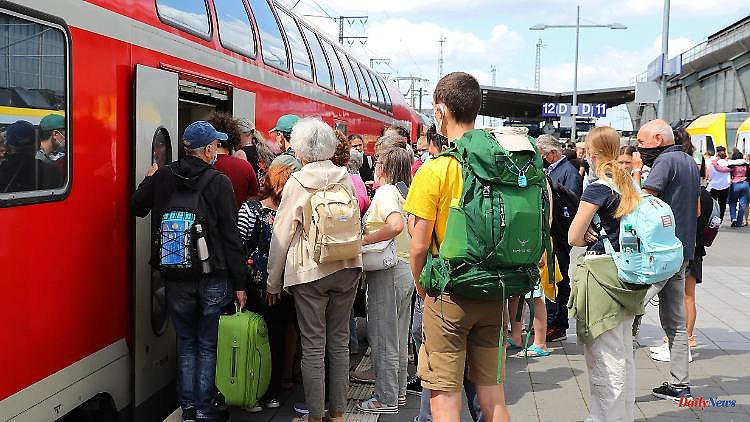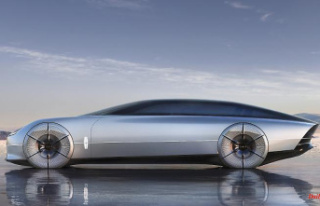Major social crises also shape the language. This is happening in view of the Ukraine war in Germany. In addition to new creations such as "Streckbetrieb" or "9-Euro-Ticket" with "fear of inflation" there is also a mothball. An overview.
Six months after the start of the Russian war of aggression in Ukraine, the effects are also being felt by consumers. This is true in the wallet as well as in everyday life - including the new and old words that are suddenly (again) read and discussed. A selection:
"Gas Storage Level"
Gas comes out of the pipe, the heater gets warm. But the war shows that it's not quite that simple. And so the people of hobby virologists train to become energy experts: How is the maintenance of Nord Stream 1 going, how much gas is already in the storage facility in Rehden? Complex processes that previously took place outside of the public eye suddenly end up under the magnifying glass. Because only the Russian reduction in gas supplies shows how dependent we are. And it also shows how vulnerable the system of energy traders and suppliers - and with it the entire economy - is to disruptions.
"Market area manager"
New themes create new players. The previously inconspicuous gas importer Uniper, for example, got into such difficulties after the reduction in Russian deliveries that the state intervened and shared the costs with all citizens by means of a levy. Which in turn puts the market area manager Trading Hub Europe in the limelight. The joint venture of the network operators for long-distance gas was previously only known to insiders - but now it decides what additional burden gas customers will have to face.
"stretching operation"
"Nuclear power? No thanks" - it was a long-standing social debate that ended in the second phase-out of nuclear power in 2011. But in 2022 there will now be serious discussion again about whether the three remaining nuclear power plants in Germany should continue to run - and whether the operation should be stretched? Outcome still uncertain, a stress test is in progress. And it was also unthinkable at the beginning of February 2022 that a Green Economics Minister would let more coal-fired power plants run again in order to secure electricity generation.
"Druschba-Pipeline"
Before the war, only experts knew which oil came through which pipeline in Germany. But suddenly thousands of jobs and the fuel supply of entire regions depend on the question, for example in the case of the Druschba pipeline to the PCK refinery in Schwedt, Brandenburg. At the climax of the discussion about an oil embargo, Federal Minister of Economics Robert Habeck even has to travel here himself to calm things down. The embargo is now in place, and the search for alternative sources of oil for Schwedt continues.
"LNG"
If the gas doesn't come through the pipeline, it has to come by ship, in liquid form as so-called LNG. So far, this has failed because of the price and the lack of terminals in Germany. But they are now suddenly being pounded out of the ground at record speed, and the first gas tankers are expected to dock at some of them by the turn of the year. They should also be fit for the future, for conversion to climate-friendly hydrogen.
"The Turbine"
As serious as war and crisis are - there are bizarre blossoms. For example, when an entire country is suddenly interested in where a Siemens Energy turbine is located, which is said to be immensely important for the regular operation of gas deliveries through Nord Stream 1. Their delivery after maintenance first becomes a diplomatic issue between Canada and Germany, then Russia's state-owned company Gazprom keeps asking for new documents. The device is now in Mülheim and even received a visit from the Chancellor. But there is still no movement in sight. Berlin accuses Russia of using technical and other reasons only as an excuse to deliver less gas to Germany and Europe.
"wiring harnesses"
Shortly after the beginning of the war, the assembly lines in BMW and Porsche factories, among others, stood still, important cable harnesses from the Ukraine were missing. The problems were resolved rather quickly - but the case shows how sensitively a networked global economy reacts to crises. Time to rethink? Many value chains had already faltered during the Corona crisis, and now the dependency on Russia is being reassessed. Other ties, such as with China, are also being scrutinized.
"Sparappell"
Saving energy has always made sense, if only for the account balance - but with the attempt to become independent of Russian gas as quickly as possible, thrift is becoming a raison d'être. The fact that politicians are providing information on their showering behavior is just the beginning; the external lighting of buildings and the water temperature in swimming pools are also becoming a topic. And there is also another discussion about whether 19 degrees is not enough for offices and apartments.
"fear of inflation"
The fear of high inflation runs deep in Germany, the experiences of two post-war generations are too present. In view of persistently low inflation rates, however, the topic recently seemed far away. However, the inflation rate has remained stubbornly above seven percent since March, driven above all by high energy and food prices, and there is hardly any relief in sight. This not only rekindles old fears, but also the political discussion about relief. Collective bargaining is not exactly getting any easier with such inflation rates.
"9-Euro-Ticket"
For 9 euros a month, you can easily travel anywhere on any local train: At the beginning of the year, such an offer would have been unthinkable, but the dynamic of the discussion after the start of the war makes many things possible. After a brief dispute over financing, the 9-euro ticket comes along - and gives so many people the opportunity to travel for little money. However, many learn first-hand how in need of repair rail transport and its infrastructure are. The intensity of the debate about a successor to the 9-euro ticket shows that the topic will remain.












